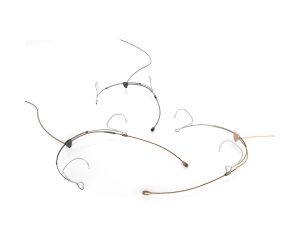
DPA Helps Bring Transparent Nordic Sound
Famed for his classical recordings, Lindberg is now focusing on immersive audio projects that require high-quality microphones and careful placement techniques
Dedicated microphone techniques and ensuring a clean and short signal path is how Norwegian Producer and Engineer Morten Lindberg achieves great sound capture for his classical music label, 2L. DPA microphones play a key part in this process because they provide the transparency and sonic clarity he needs for his projects. This is particularly true for his immersive recordings, which are not only transforming the entire listening experience, but also overturning some very basic concepts regarding how music is composed and performed.
The music captured by 2L features Norwegian composers and performers and an international repertoire reflected in the Nordic atmosphere. 2L began as a production company, but is now also a record label, releasing 10 to 15 recordings a year, all on Hybrid SACD, Pure Audio Blu-ray and distributed as HiRes files. Until 2020, Lindberg held the record for the most GRAMMY nominations without a win ― 36 in total, with 28 of them in craft categories such as Best Engineered Album, Best Surround Sound Album and Producer of the Year. Finally, at this year’s GRAMMYs, Lindberg carried off the award for Best Immersive Audio with the album LUX.
“I believe our recordings make an impact because they come from the heart and soul of everyone involved,” Lindberg says. “We don’t speculate on what a commercial market might want ―we make what we would like to experience ourselves, and that makes it personal.”
2L usually records in spacious acoustic venues such as large concert halls, churches and cathedrals. Lindberg believes the openness of these spaces actually deliver the most intimate recordings thanks to the absence of close reflecting walls. However, capturing the sound he wants, especially for immersive audio projects, requires careful microphone choices and positioning, which is where DPA comes in.
“Our ‘2L-cube’ microphone array is really a consequence of the speaker configuration in the Auro-3D playback system,” Lindberg explains. “Time of arrival, SPL and on-axis HF texture is directly preserved in our 7.1.4 microphone configuration. Proportions are cubical and the dimensions could vary from 120cm for a large orchestral array down to 40cm in an intimate chamber musical context.”
The 2L-cube is usually configured with seven matched DPA 4041S Omnidirectional Microphones and four matched DPA 4003 microphones in the upper layer. Although these 130V versions are no longer available for sale, anyone wishing to replicate this setup could use the Phantom powered versions ― the 4006 and the 4041SP.
“I always use DPA omnidirectional microphones in the main array, but depending on the room, the music and the instruments, I alternate between my DPA 4003 and the 4041. The latter has a larger membrane and provides a more focused on-axis texture,” he adds.
Lindberg has been a fan of DPA microphones throughout his recording career, starting with a matched pair of B&K 4003 mics, which he used to record straight to DAT. “Rather than exploring a wide range of makes and models, I stayed with DPA and spent my time getting to know them intimately,” he says. “To maximise the potential of the DPA High Voltage concept, we have a custom-built power supply feeding 200V and 130V on four- and seven-pin XLR totally transparent to the microphones.
“When preparing for distribution, we target the playback situation with separate mixes. For Auro-3D or Dolby Atmos, all 7.1.4 microphones go directly to their accompanying loudspeaker. With diminishing numbers of loudspeakers, we do not sum or fold-down. We take away sources. So, for 5.1, only the lower bed of microphones, without the side-fills, are active. Then it is usually only the front left and right microphones playing in stereo, possibly with a slight texture added from the rear microphones. Pure, clean and minimalistic. Our philosophy is simple: one microphone straight to one speaker. The important aspect is to configure the array so that time of arrival is captured and released in a natural order.”
Keeping the signal path short and clean means using the least amount of components as possible, including microphones, Lindberg says. “Our sonic image is created in the recording with dedicated microphone techniques. I don’t spread as many microphones as possible for someone else to pull the faders in post-production. I make my choice there and then so I have a result that will serve the fundamentals of decisions to follow. A simple and pure signal path is the means to true high-resolution audio. Not only at recording, but also preserving the purity through editing, mixing and mastering.”
Due to the current limitations on movement and gatherings of people, it may be that studios will have to take the place of venues for Lindberg’s next few recording projects, but he is confident that 2L will still be making music.
“The beauty of the recording arts is that there is no fixed formula and no blueprint. It all comes out of the music,” he says. “A really good recording should be able to bodily move the listener. This core quality of audio production is made by choosing the right venue for the repertoire, and by balancing the image in the placement of microphones and musicians relative to each other in that venue. As recording engineers and producers, we need to do exactly the same as any good musician: interpret the music and the composer’s intentions and adapt to the media where we perform.”
















RESPONSES